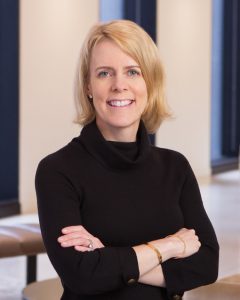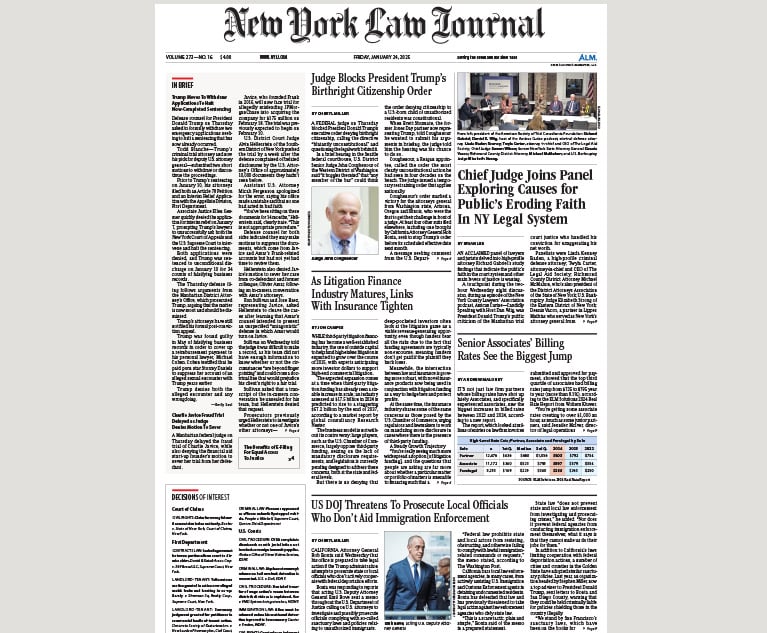Are Law Firms Ready for Generation Z? They'd Better Be.
In 2018, Orrick partnered with New York University to launch a program to introduce Generation Z to the legal world, said Orrick's Chief Talent Officer Siobhan Handley who works out of NY.
February 26, 2019 at 07:16 AM
9 minute read
The original version of this story was published on The American Lawyer
 Credit: Kelly Hume
Credit: Kelly Hume
Move over, millennials, there's a new kid looming on the legal beat.
Seemingly born with smartphones in hand, Generation Z is a generation of digital natives. Its members grew up alongside the internet, and technology has been a part of their lives from the very beginning. They may share some characteristics with their millennial counterparts, including a commitment to social justice, but the next crop of lawyers will present unique challenges for their future employers. With the oldest members of Generation Z currently making their way through law school, life in Big Law is on the horizon. Are law firms ready?
Although there's no official date for when Generation Z begins, the Pew Research Center generally defines the members of Gen Z as those born in or after 1997 (some others have moved up that admittedly arbitrary benchmark to 1995). The generational boundary gives members of Gen Z one major distinguishing characteristic: their connection to technology.
“Millennials were living a life where technology was changing things and they were on the forefront of the change,” says Orrick, Herrington & Sutcliffe chief talent officer Siobhan Handley. “Gen Z doesn't know a time before [that change].”
The oldest members of the Gen Z cohort, also known as the iGeneration, were only around 10 years old when the iPhone launched in 1997. As they entered their teenage years, the world became more interconnected through the widespread saturation of Wi-Fi, smartphones and high-bandwidth cellular service. A survey last year by Pew Research of teens, social media and technology found that 95 percent of adolescents have a smartphone or access to one. And 45 percent of teens said they were online on “a near-constant basis.”
“The smartphone has been their method of doing everything,” says Wake Forest University law professor Laura Graham.
But with increased exposure to and knowledge of technology come distinct changes in the way Gen Zers communicate with one another—and with those in other generations.
A 2014 study by marketing research firm sparks & honey found that while Gen Zers are agile communicators, able to rapidly respond to banter, this also means they are less precise with their verbiage. As they enter the workforce—and the legal profession, in particular—their preferred methods of communication may run counter to the skills necessary to navigate life and succeed at a large law firm. Gen Xers and millennials are used to communicating via email, but such a platform is almost ancient for Gen Zers, Graham says.
“They're not comfortable with emailing, [and] they don't know email etiquette,” says the law professor, who late last year wrote a paper about teaching law to the post-millennial generation.
And it's not just emailing where Gen Zers struggle.
 Wake Forest University law professor Laura Graham
Wake Forest University law professor Laura Graham“In general, Gen Zers are not that comfortable with in-person communication or making a phone call,” Graham says. “Perhaps more than ever it's going to require some training, maybe for new associates, on workplace communication, communicating with clients and how to communicate professionally when you're not texting, Snapchatting or using Instagram or Twitter.”
Gen Z's attachment to technology has changed the way its members work with others. While millennials have become known for their desire for a collaborative workplace, Gen Zers don't necessarily share their counterparts' enthusiasm.
“They're a little more like the baby boomer generation in terms of their need for being a little siloed and working individually, rather than millennials, who were very team-focused,” says Courtney Dredden Carter, associate director of diversity and inclusion at Jenner & Block.
“Because they grew up with all of this technology and social media since they were in elementary school, they're used to going into a room and being on their social media platforms and getting all their work done individually and independent of others, as opposed to being more focused on working in groups,” Carter adds.
For the legal profession, this presents an interesting quandary.
“It's the opposite extreme of the old apprenticeship model,” Charlotte Wager, Jenner & Block's chief talent officer, says. “You used to learn everything at the right hand of your mentor.”
Wager, a past president of the National Association for Law Placement, says firms must now emphasize the importance of in-person communication within the practice of law.
“We have to emphasize a lot through orientation, through communication training [and] mentoring programs, how important it can be just to sit face-to-face and make eye contact,” Wager says.
While a majority of Gen Zers—84 percent—say that they prefer communicating with their bosses face-to-face, they prefer if those meetings last five minutes or less, according to a 2017 survey conducted by generational researcher David Stillman.
“They're not used to receiving a ton of criticism or critical feedback,” Graham says. “This is the every-person-gets-a-trophy [generation].”
As Graham sees it, many Gen Zers have hovering, helicopter-like parents who have protected them from the consequences of their actions and tried to make life easy on them. Given this level of protection and insulation, some members of Gen Z don't respond well when given criticism, even if it's constructive, she says.
“When I think about them interacting with senior attorneys and supervisors who are used to being able to offer criticism, and sometimes not very kindly … I think the employer will have to work with the Gen Z associate to help them understand the process of doing some work and getting some critical feedback and not taking that as anything insulting,” Graham says. “Getting critical feedback is part of how you learn. It's part of the training and the mentoring that we hope is still happening in these law firms.”
But while many firms will seek to adjust their protocols to accommodate this new young crop of legal talent, Gen Zers also present firms with an opportunity to use their individuality and independence to their advantage.
“There's constant contact, which I think can be leveraged in the way we work and connect with our clients,” says Orrick's Siobhan Handley.
 Orrick's Siobhan Handley
Orrick's Siobhan HandleyOne way Orrick plans on doing so is through a new series of fellowships for first-year law students, in which students work at the firm for a portion of the summer and then spend the rest of the time with an Orrick client in the technology sector. In 2018, Orrick partnered with New York University to launch the program and is now expanding it to six other law schools, including Harvard University, Stanford University and Yale University.
Handley, who took over talent development efforts at Orrick four years ago, explains that developing such a program allows the firm to provide young lawyers with a different experience in the hope that it will translate into a longer, stronger connection to Orrick. But the program also illustrates another unique characteristic of Gen Zers—their entrepreneurial individuality.
In 2015, the Gallup-HOPE index reported that 42 percent of fifth-through-12th graders said they planned to start their own business. That same year, 42 percent also said they would invent something that changes the world. Tapping into that entrepreneurial spirit, Handley says, is something that firms like Orrick are keen to capitalize on.
Unlike previous generations, Gen Zers are seemingly much more frank about their desires to expand beyond the traditional Big Law experience.
“They view their careers differently,” says Akin Gump Strauss Hauer & Feld hiring partner David Botter. “They're very open about the fact that they may not work in one place for 30 years. They're openly talking about exit opportunities.”
Gen Zers want to know what firms can do to help them in their careers, which most likely will include several stops, Botter says, and they're doing everything in their power to build their own futures.
“We're perceiving them to be self-advocates,” Botter says. “They are proactively seeking help in their careers and certainly focusing us and themselves on their own professional development.”
And these young legal minds are demanding that firms take action not only in the career development realm.
“They want to see law firms that are recruiting and retaining diverse talent,” Botter says.
A 2018 analysis of U.S. Census Bureau data by Pew Research found that Gen Zers are the most racially and ethnically diverse generation. Nearly half, or 48 percent, of 6-to-21-year-olds identified as nonwhite, a sharp increase when compared with 39 percent of millennials and 30 percent of Gen Xers, according to Pew Research.
“[Law firms] are trying to make inroads to become more diverse to reflect their clients and meet client demands,” says Michelle Fivel, a partner at legal recruiting firm Major, Lindsey & Africa.
As the youngest generation enters the legal profession, Gen Zers will continue to be a hot-button issue, Fivel says. The upheaval they'll bring with them translates into power for job candidates at big firms, and they could help Big Law solve its endemic diversity problem, she adds.
Just as they did with millennials, large firms will be confronted with their future and that of the profession over the next few years. By understanding what drives the burgeoning generation of legal professionals, Big Law can ensure that it's ready to rise to the challenge.
Email: [email protected]
This content has been archived. It is available through our partners, LexisNexis® and Bloomberg Law.
To view this content, please continue to their sites.
Not a Lexis Subscriber?
Subscribe Now
Not a Bloomberg Law Subscriber?
Subscribe Now
NOT FOR REPRINT
© 2025 ALM Global, LLC, All Rights Reserved. Request academic re-use from www.copyright.com. All other uses, submit a request to [email protected]. For more information visit Asset & Logo Licensing.
You Might Like
View All
Paul Hastings, Recruiting From Davis Polk, Adds Capital Markets Attorney
3 minute read
Neighboring States Have Either Passed or Proposed Climate Superfund Laws—Is Pennsylvania Next?
7 minute readTrending Stories
- 1New York-Based Skadden Team Joins White & Case Group in Mexico City for Citigroup Demerger
- 2No Two Wildfires Alike: Lawyers Take Different Legal Strategies in California
- 3Poop-Themed Dog Toy OK as Parody, but Still Tarnished Jack Daniel’s Brand, Court Says
- 4Meet the New President of NY's Association of Trial Court Jurists
- 5Lawyers' Phones Are Ringing: What Should Employers Do If ICE Raids Their Business?
Who Got The Work
J. Brugh Lower of Gibbons has entered an appearance for industrial equipment supplier Devco Corporation in a pending trademark infringement lawsuit. The suit, accusing the defendant of selling knock-off Graco products, was filed Dec. 18 in New Jersey District Court by Rivkin Radler on behalf of Graco Inc. and Graco Minnesota. The case, assigned to U.S. District Judge Zahid N. Quraishi, is 3:24-cv-11294, Graco Inc. et al v. Devco Corporation.
Who Got The Work
Rebecca Maller-Stein and Kent A. Yalowitz of Arnold & Porter Kaye Scholer have entered their appearances for Hanaco Venture Capital and its executives, Lior Prosor and David Frankel, in a pending securities lawsuit. The action, filed on Dec. 24 in New York Southern District Court by Zell, Aron & Co. on behalf of Goldeneye Advisors, accuses the defendants of negligently and fraudulently managing the plaintiff's $1 million investment. The case, assigned to U.S. District Judge Vernon S. Broderick, is 1:24-cv-09918, Goldeneye Advisors, LLC v. Hanaco Venture Capital, Ltd. et al.
Who Got The Work
Attorneys from A&O Shearman has stepped in as defense counsel for Toronto-Dominion Bank and other defendants in a pending securities class action. The suit, filed Dec. 11 in New York Southern District Court by Bleichmar Fonti & Auld, accuses the defendants of concealing the bank's 'pervasive' deficiencies in regards to its compliance with the Bank Secrecy Act and the quality of its anti-money laundering controls. The case, assigned to U.S. District Judge Arun Subramanian, is 1:24-cv-09445, Gonzalez v. The Toronto-Dominion Bank et al.
Who Got The Work
Crown Castle International, a Pennsylvania company providing shared communications infrastructure, has turned to Luke D. Wolf of Gordon Rees Scully Mansukhani to fend off a pending breach-of-contract lawsuit. The court action, filed Nov. 25 in Michigan Eastern District Court by Hooper Hathaway PC on behalf of The Town Residences LLC, accuses Crown Castle of failing to transfer approximately $30,000 in utility payments from T-Mobile in breach of a roof-top lease and assignment agreement. The case, assigned to U.S. District Judge Susan K. Declercq, is 2:24-cv-13131, The Town Residences LLC v. T-Mobile US, Inc. et al.
Who Got The Work
Wilfred P. Coronato and Daniel M. Schwartz of McCarter & English have stepped in as defense counsel to Electrolux Home Products Inc. in a pending product liability lawsuit. The court action, filed Nov. 26 in New York Eastern District Court by Poulos Lopiccolo PC and Nagel Rice LLP on behalf of David Stern, alleges that the defendant's refrigerators’ drawers and shelving repeatedly break and fall apart within months after purchase. The case, assigned to U.S. District Judge Joan M. Azrack, is 2:24-cv-08204, Stern v. Electrolux Home Products, Inc.
Featured Firms
Law Offices of Gary Martin Hays & Associates, P.C.
(470) 294-1674
Law Offices of Mark E. Salomone
(857) 444-6468
Smith & Hassler
(713) 739-1250








